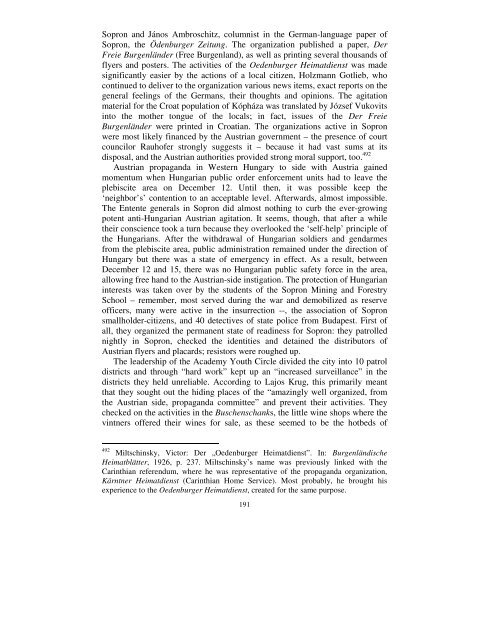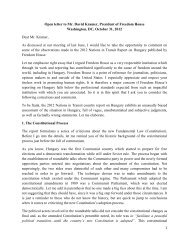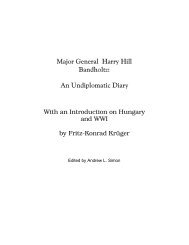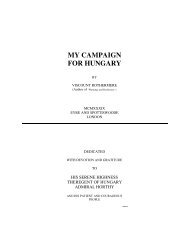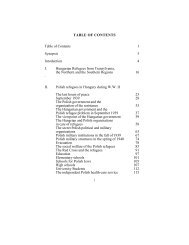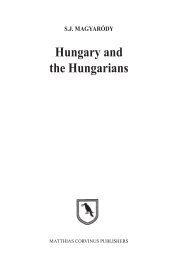The Fate of Western Hungary 1918-1921 - Corvinus Library ...
The Fate of Western Hungary 1918-1921 - Corvinus Library ...
The Fate of Western Hungary 1918-1921 - Corvinus Library ...
Create successful ePaper yourself
Turn your PDF publications into a flip-book with our unique Google optimized e-Paper software.
Sopron and János Ambroschitz, columnist in the German-language paper <strong>of</strong><br />
Sopron, the Ödenburger Zeitung. <strong>The</strong> organization published a paper, Der<br />
Freie Burgenländer (Free Burgenland), as well as printing several thousands <strong>of</strong><br />
flyers and posters. <strong>The</strong> activities <strong>of</strong> the Oedenburger Heimatdienst was made<br />
significantly easier by the actions <strong>of</strong> a local citizen, Holzmann Gotlieb, who<br />
continued to deliver to the organization various news items, exact reports on the<br />
general feelings <strong>of</strong> the Germans, their thoughts and opinions. <strong>The</strong> agitation<br />
material for the Croat population <strong>of</strong> Kópháza was translated by József Vukovits<br />
into the mother tongue <strong>of</strong> the locals; in fact, issues <strong>of</strong> the Der Freie<br />
Burgenländer were printed in Croatian. <strong>The</strong> organizations active in Sopron<br />
were most likely financed by the Austrian government – the presence <strong>of</strong> court<br />
councilor Rauh<strong>of</strong>er strongly suggests it – because it had vast sums at its<br />
disposal, and the Austrian authorities provided strong moral support, too. 492<br />
Austrian propaganda in <strong>Western</strong> <strong>Hungary</strong> to side with Austria gained<br />
momentum when Hungarian public order enforcement units had to leave the<br />
plebiscite area on December 12. Until then, it was possible keep the<br />
‘neighbor’s’ contention to an acceptable level. Afterwards, almost impossible.<br />
<strong>The</strong> Entente generals in Sopron did almost nothing to curb the ever-growing<br />
potent anti-Hungarian Austrian agitation. It seems, though, that after a while<br />
their conscience took a turn because they overlooked the ‘self-help’ principle <strong>of</strong><br />
the Hungarians. After the withdrawal <strong>of</strong> Hungarian soldiers and gendarmes<br />
from the plebiscite area, public administration remained under the direction <strong>of</strong><br />
<strong>Hungary</strong> but there was a state <strong>of</strong> emergency in effect. As a result, between<br />
December 12 and 15, there was no Hungarian public safety force in the area,<br />
allowing free hand to the Austrian-side instigation. <strong>The</strong> protection <strong>of</strong> Hungarian<br />
interests was taken over by the students <strong>of</strong> the Sopron Mining and Forestry<br />
School – remember, most served during the war and demobilized as reserve<br />
<strong>of</strong>ficers, many were active in the insurrection --, the association <strong>of</strong> Sopron<br />
smallholder-citizens, and 40 detectives <strong>of</strong> state police from Budapest. First <strong>of</strong><br />
all, they organized the permanent state <strong>of</strong> readiness for Sopron: they patrolled<br />
nightly in Sopron, checked the identities and detained the distributors <strong>of</strong><br />
Austrian flyers and placards; resistors were roughed up.<br />
<strong>The</strong> leadership <strong>of</strong> the Academy Youth Circle divided the city into 10 patrol<br />
districts and through “hard work” kept up an “increased surveillance” in the<br />
districts they held unreliable. According to Lajos Krug, this primarily meant<br />
that they sought out the hiding places <strong>of</strong> the “amazingly well organized, from<br />
the Austrian side, propaganda committee” and prevent their activities. <strong>The</strong>y<br />
checked on the activities in the Buschenschanks, the little wine shops where the<br />
vintners <strong>of</strong>fered their wines for sale, as these seemed to be the hotbeds <strong>of</strong><br />
492 Miltschinsky, Victor: Der „Oedenburger Heimatdienst”. In: Burgenländische<br />
Heimatblätter, 1926, p. 237. Miltschinsky’s name was previously linked with the<br />
Carinthian referendum, where he was representative <strong>of</strong> the propaganda organization,<br />
Kärntner Heimatdienst (Carinthian Home Service). Most probably, he brought his<br />
experience to the Oedenburger Heimatdienst, created for the same purpose.<br />
191


